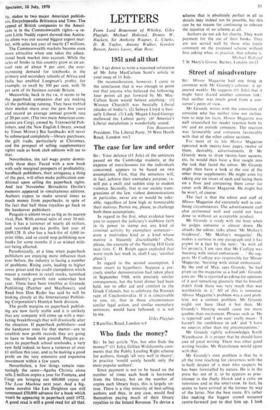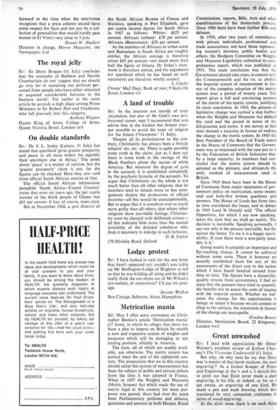Street of misadventure
Sir: Mirror Magazine had one thing in common with Mr Grundy's column: it ap- peared weekly. He suggests (1 1 July) that it might have shared another common link : that neither was much good from a con- sumer's point of view.
Mr Grundy writes with the conviction of someone who has neither time nor inclina-
tion to stop for facts. Mirror Magazine was well researched for reader reaction both by 1PC and an outside company. The reaction was favourable and compares favourably with that of the other colour sections.
For most of its life Mirror Magazine operated with twenty-four pages, twelve of them, desirably, advertisements. If Mr Grundy were to draw twenty-four squares, etc, he would then have a first insight into the task that faced the editor. Mr Grundy might then have a look at the size of the other three supplements. He might even try taking any six issues of each and laying them on a floor and comparing them cover for cover with Mirror Magazine. He might but he won't, of course.
The fact is that the editor and staff of Mirror Magazine did extremely well in con- fining circumstances. The advertisement staff also performed well and could not have done so without an acceptable product.
Mr Grundy is ready with the boot when he judges someone is almost down. He attacks the editor, talks about `Mr Molloy's brashness', `Mr Molloy's magazine'. He makes a surmise in one paragraph and it has gr4?wn to a fact by the next: 'As with all his projects, I am sure that Mr Cudlipp was bursting with initial enthusiasm ...' He sug- gests Mr Cudlipp was responsible for Mirror Magazine, 'bursting with initial enthusiasm'. By the end of May, says Grundy, 'he had given up the magazine as a bad job.' Grundy goes on: 'He is reported as asking for opinions of it and remarking gloomily that he himself didn't think there was very much that was worthwhile in it.' All of this is nonsense. Mirror Magazine's problem was a cost prob- lem; not a content problem. Mr Grundy might not have liked it but then, Mr Grundy's blessing would cause me more qualms than excitement. Phrases such as 'He is reported' and 'I am sure' really mean : 'I haven't the confidence to ask' and 'I have no sources other than my preconceptions.'
Mr Grundy rightly acknowledges Keith Waterhouse. It is proper that he should have awe of good writing. There was other good writing besides. Mr Waterhouse would agree with that.
Mr Grundy's own problem is that he is all the time reaching for cleverness with-the
in-built despair of a man who suspects he has been forestalled by nature. He is in the press but not of it, so he appears as prac- titioner in the Daily Sketch and a critic on
television and in the SPECTATOR. In fact, he seems to have arrived at the former by way
of the latter. Not the best route. It's rather like making the biggest crowd nuisance centre-forward just to shut him up. I look
forward to the time when the SPECTATOR recognises that a press column should have some respect for facts and not just be a col- lection of generalities that would hardly pass muster in El Vino's very close to 3 p.m.
Dennis W. Hackett Director in charge, Mirror Magazine, trc Newspapers Ltd























































 Previous page
Previous page